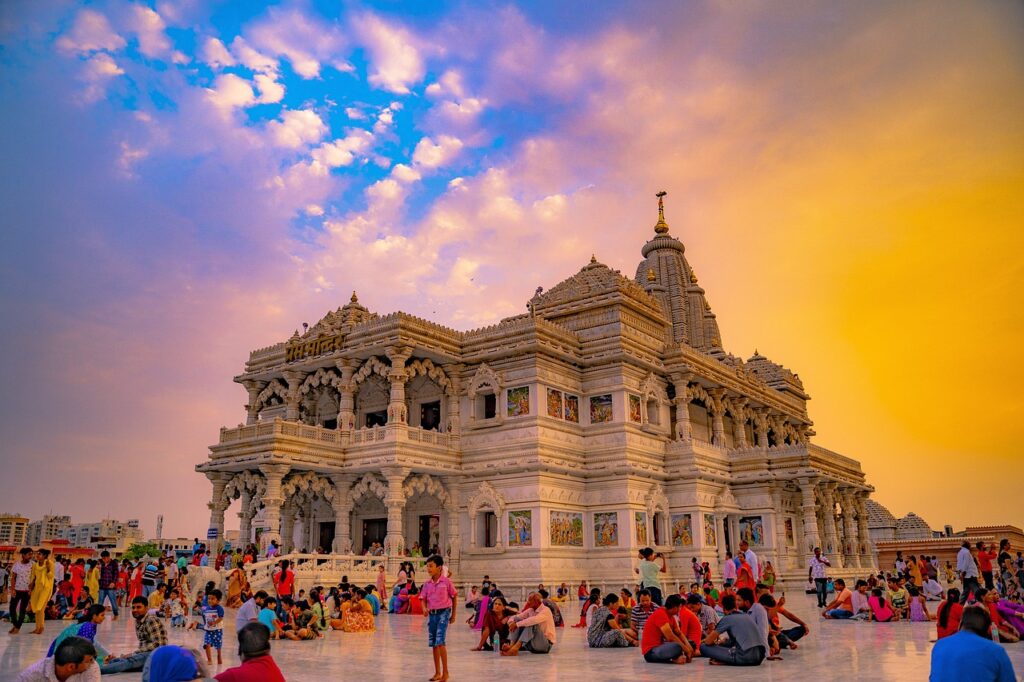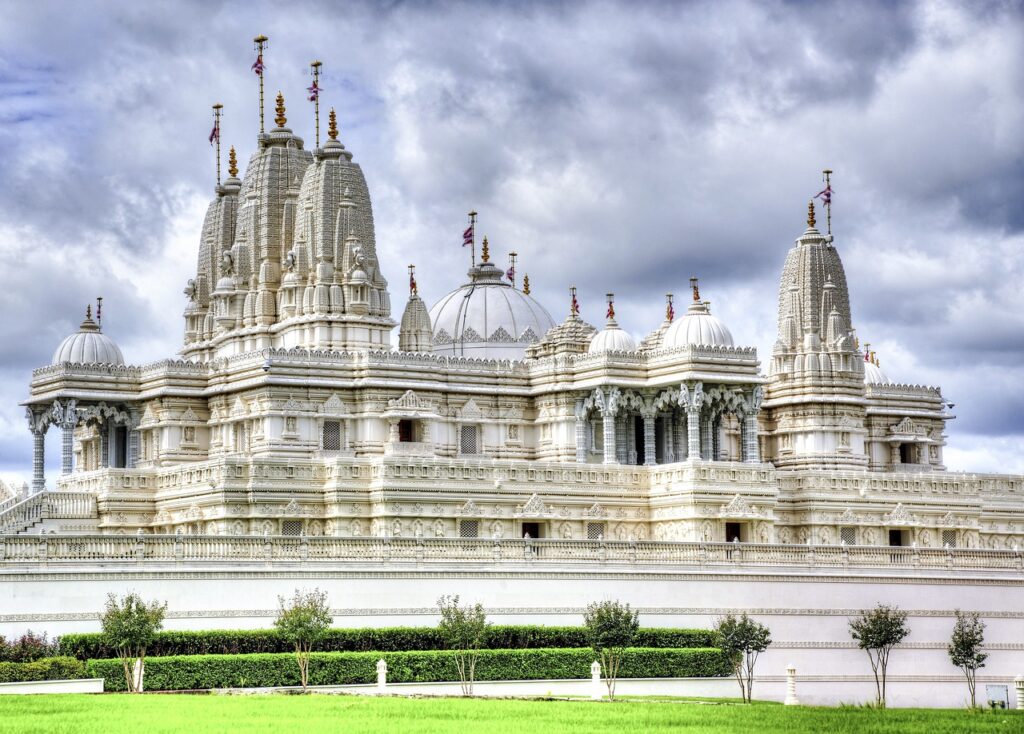
The primary objective of a Vedic temple is not simply to serve as a venue for prayers and pujas, but rather to inspire individuals to delve deeper into the Vedic spiritual path and tradition, and participate in it. This crucial aspect of a temple’s purpose is often overlooked. Without invoking inspiration, temples run the risk of becoming stagnant and losing their relevance in contemporary times. If this happens, in a few generations, they may become nothing more than relics, or even worse, warehouse-like structures.
To ensure the continuity of the Vedic community and culture, temples must create an environment that fosters inspiration. This can be achieved by motivating people to recognize the benefits of the Vedic traditions, understand the tradition’s purpose more profoundly, and comprehend why they should participate in the culture and its spiritual practice. Through service or seva, people can experience deeper spiritual happiness and a sense of fulfillment from the Dharmic path that is unattainable through material pursuits or sensual desires. In addition, the temple can provide access to secret knowledge about life and its purpose that is not readily available elsewhere.

Furthermore, individuals can deepen their understanding of their eternal spiritual identity and connection with the Divine through participation in temple activities. By helping in the operation of the temple, they can also gain a greater appreciation for the temple’s role as a launching pad to the higher purpose of life, spiritual dimensions of existence, and refined states of consciousness and fulfillment that everyone seeks. To secure a bright future for the Vedic community, Dharmic tradition, and humanity as a whole, the temple must transform individuals from mere observers to appreciators and eventually participants. This can be achieved by motivating them to take on responsibilities to help the temple in service to the deities and other temple members or the general community. If the temple can successfully inspire people to become active participants, it will help ensure a bright future for the entire Vedic community and humanity. The main focus of this article is to explore the essential purposes and objectives of a Vedic temple.
#1 Sharing the Beauty of Vedic Culture
The best way to protect, preserve, promote, and perpetuate Vedic Dharma is through the temples. Imparting the universal spiritual truths as found in Sanatana-dharma, the Vedic traditions, is like spreading a cultural and spiritual revolution. And the center of that cultural revolution is the Vedic temples. The temples are the main facility to preserve this spiritual heritage and also to disseminate it through what temples provide for people to participate. This is also important for handing it down to the following generations. This is how most people learn about it and understand its importance, and develop the determination and sincerity to follow it and uphold its standards. This is how people remain resilient to keep it in their hearts no matter what else may happen. The temples are the centers from which the spiritual truths can expand throughout the community and beyond. Temples are also like launching pads from which sincere devotees can prepare for entering the spiritual dimension. This is why temples should be as effective as possible.

Temples are considered part of the spiritual atmosphere or the transcendental dimension, maintained by sadhana, ritual, service, mantras, and the presence of the devotees and deities. It is here where Ishwara, Bhagavan, is more easily accessible for the spiritually focused devotee, like a launching pad for a space-bound rocket. It is the temple and through the deity where we especially have darshan, the act of not only seeing the Lord but being seen by the Lord. But temples should also be the embassies of the spiritual world, the domain of the Supreme Lord, open for fulfilling the spiritual needs of everyone. They should help bring the spiritual world and its vibration, energy, and atmosphere into this material creation, and help bring all others back into the spiritual domain by awakening them to their spiritual identity.
#2 Inspiring others become a part of Vedic culture
Temples serve as a gateway for individuals to connect with the essence of Vedic culture, which centers on serving the Supreme for the attainment of spiritual enlightenment. By actively participating in various temple activities and programs, one can immerse oneself in the Vedic way of life. As one becomes more familiar with Vedic customs, rituals, sacrifices, and etiquettes, they can gradually incorporate these practices into their daily routine, leading to the purification of their existence and the realization of the eternal values of the Vedic lifestyle. The temple provides a nurturing environment for individuals to learn, grow, and deepen their understanding of the Vedic path, ultimately leading them towards spiritual progress and inner fulfillment.
#3 Engaging in devotion through deity worship
Although God is present everywhere, perceiving Him can be challenging without a spiritual vision. Temples provide an ideal environment for nurturing one’s spiritual nature. The Lord exists beyond our ordinary senses, and we can only perceive Him to the extent that we have purified ourselves or dedicated ourselves to His service. Nevertheless, the Lord, in His mercy, appears in the form of His deity in the temple, allowing us to see and worship Him. The deity form in the temple is not a mere stone or wooden idol but the Lord Himself, who has complete control over all energies.

True worship is not merely seeking forgiveness for wrongdoings, but an immersive experience that engages all senses in the service of the Supreme. Having a physical form to worship is essential to engage all senses in worship, and the temple provides the perfect opportunity for that. In a temple, we can see the deity’s form, smell the flowers and incense, feel the water and light, taste the food, and hear the sound of the bell ringing during puja, thereby spiritually awakening all our senses.
#4 Association of Devotees
Similar to how schools motivate students to study, visiting a temple can help individuals stay focused on their spiritual life. Without association with fellow devotees, it can be incredibly difficult to escape the illusionary energy of the Supreme Lord, known as Maya. As the Bhagavad Gita teaches, Maya is exceptionally tough to overcome alone (mama maya duratyaya). However, those who surrender themselves to the Supreme Lord and seek His divine shelter can quickly achieve this challenging objective (mam eva ye prapadyante mayam etam taranti te).

The association of fellow devotees is significant as it reminds individuals of the potential negative consequences of leading a materialistic life and inspires them to engage in devotional service towards the Supreme Lord. Thus, a consistent spiritual practice, combined with the support of fellow devotees, is essential for those who aspire to progress on the path of transcendence.
#5 Dissemination of Vedic Knowledge
The Vedic spiritual knowledge offers unparalleled insight into the purpose of our existence and our true identity. It provides a rare and unique view of our place in this world and the path we are meant to take. This knowledge is invaluable and must be preserved and shared with future generations. Temples are the ideal places to impart this knowledge, as they are considered centers of sacred spiritual education, which commands reverence and respect.

It is essential for younger generations to understand that the temple is not just a place for worshipping the Divine in the deity form, but also a center for obtaining sacred spiritual knowledge that helps one attain a higher understanding of their own identity and the importance of the Vedic tradition. Without this understanding, the Vedic system may gradually lose its significance, and the reason for visiting the temple may fade away with each generation.
Secular schooling, sports, and social activities are necessary for an individual’s growth and development, but they cannot provide the spiritual knowledge and understanding that can be obtained through the Vedic system. We need to acknowledge the importance and value of spiritual development in addition to other aspects of our lives, as it helps us reach our highest potential and provides fulfillment that cannot be found elsewhere.
Therefore, it is vital to recognize that temples play a crucial role in our social, cultural, and spiritual development. They offer a unique opportunity to access and receive the sacred Vedic spiritual knowledge that can transform our lives and help us achieve our ultimate purpose. The younger generation needs to understand and appreciate the significance of temples and the invaluable knowledge they provide for personal growth and fulfillment.